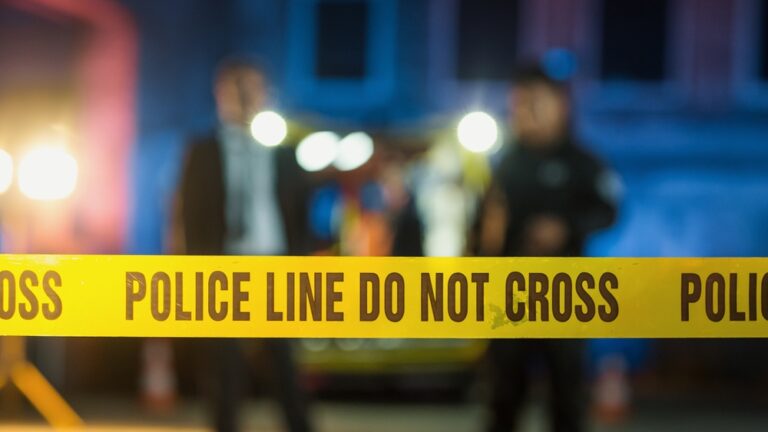
Police Tape 101: Everything You Need to Know
Police tape, commonly known as crime scene tape, is an important tool used by law enforcement to secure…
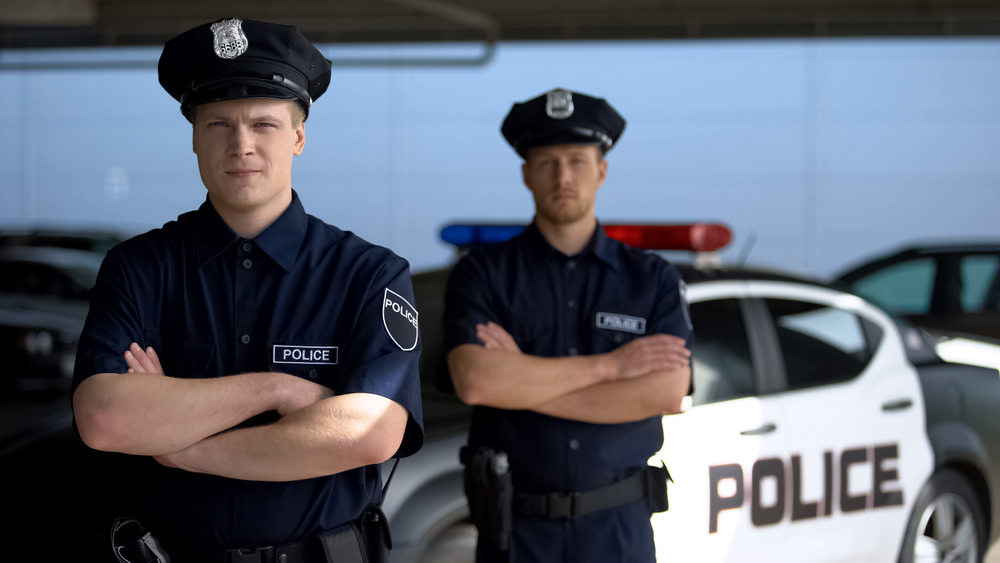
Foreverpolice.com recently studied 120 job descriptions for police officers at indeed.com, police1.com, and others.
I was looking for what personal skills you need to be working in law enforcement from the employer’s perspective.
Other skills mentioned here are not found in the job descriptions but are commonly accepted skills of a police officer.
It’s boiled down to an easy-to-read list so that you can quickly find exactly what skills you need as a police officer.
The following are outcomes of the study:
A police officer’s job can be tough and straining, but you always have to act professionally.
Some of the vital skills you need in this job are paying attention to minor and major details, the ability to adapt to certain uncomfortable conditions, and critical thinking.
NB: Lack of professionalism and not doing the job properly could have serious consequences to other peoples’ lives.
Just because your personality gives you a higher rank in the possibility of having this profession, it does not automatically imply that you will do a good job. Training and maintaining the skills is a must for being a good law enforcement officer.
Also, note that lack of or a low score on some abilities doesn’t exclude you from becoming a good police officer.
There will come a time that one has to have a conscious fight between their beliefs or opinions in life and the profession. For you to be a good police officer, your first choice should always be your profession.
You should always stand by the rules. However, there are exceptions. I will cover that in another article.
The Bottom Line: Several skills are vital in becoming a good police officer. You will face many challenges, dilemmas, and situations. Some of the skills will help you do your job accurately, while others will make sure that you nobly serve others.
So, let us get started.
After going through 120 job descriptions, I’ve found that the top 5 skills employers are looking for are:
The main focus was on practical skills like using weapons, tools, driving, self-defense techniques, and more. These skills are called hard skills.
That was a bit disappointing because several other skills are needed to make a good police officer. And those are soft skills. I would argue that you will rely more on your soft skills than your hard skills in the job.
The soft skills mentioned were cultural sensitivity, situation awareness, ability to remain calm, and the like.
On the positive side, hard skills are trainable.
In the following skill list, there is a mix between soft skills and hard skills a police officer must-have.
According to research, the top skills a law enforcement officer must have are:
In addition, police officers must have good physical health and be able to solve problems, whether practical or verbal.
Being extroverted, having the ability to gather information and resolve conflicts through dialogue are key qualities for making a good law enforcement officer.
Yes, this one sucks, but the job of a police officer is a job you grow into. Developing many of these skills comes with experience and exposure.
To become a successful police officer you will need many of the following skills and characteristics I discussed below.
Why not try a ride along with you local police and see the police officer skills practiced? We’ve created this “Police Ride-Along Guide” for those interested in doing one.
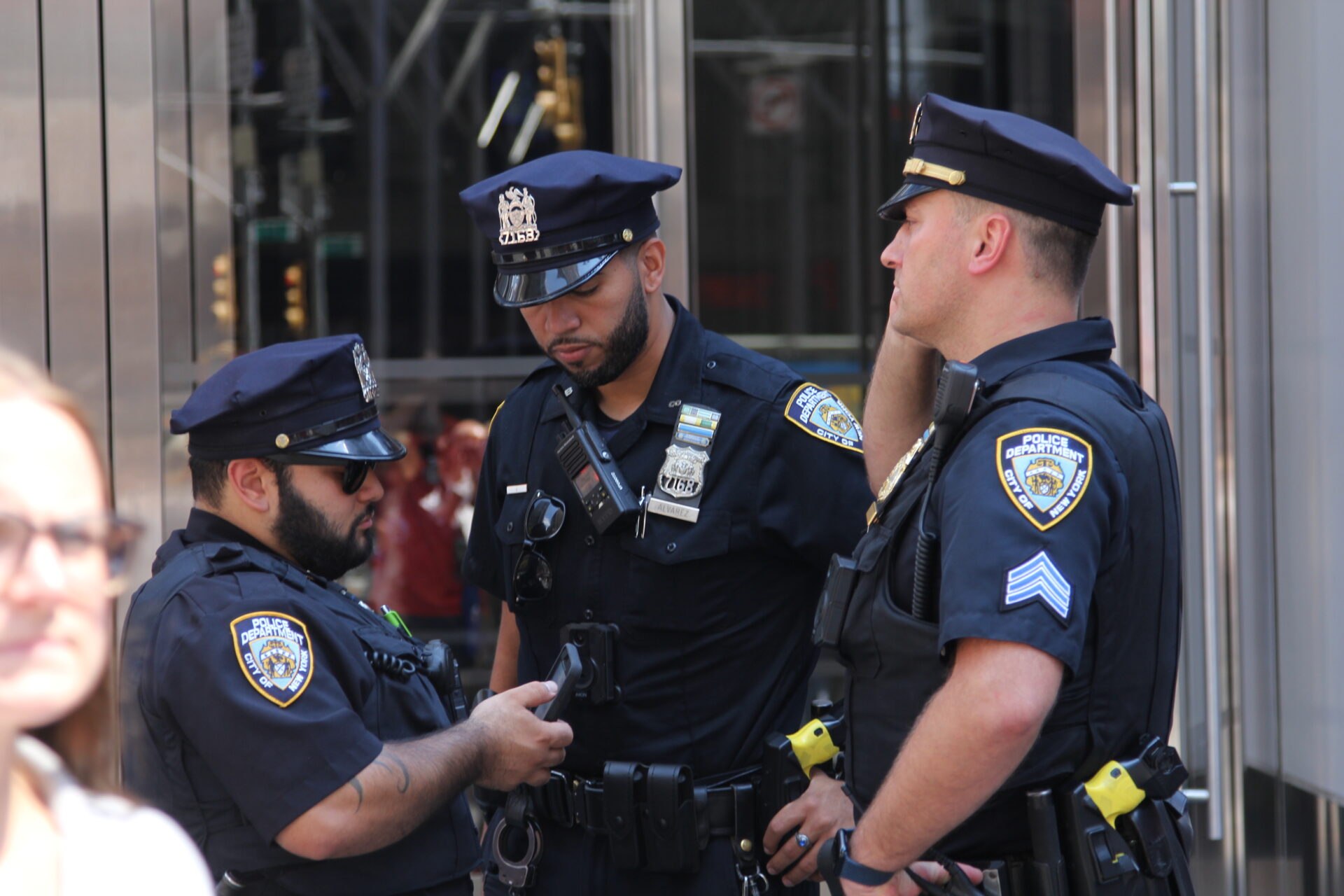
This is extremely important for a police officer because most of your tasks will get done by communicating with others. From conflict resolution to gathering information, everything is mostly done with you communicating with other people or your local community.
“Verbal agility” will help you a long way in this job.
It is a trait that not everyone is equally good at. However, this skill is highly trainable, and there are lots of courses that teach you how to improve your communication skills.
The concept of communication is broad. There are several subcategories, some more important than others. These are verbal, non-verbal, and written communication and active listening, just to list a few.
These are words or vocal noises that are used to give and pass information.
This is the use of gestures to pass information. Your body language, facial expression, eye contact, tone level, stress, and volume, and more are examples of non-verbal communication.
To communicate most effectively, verbal and non-verbal communication has to match with your message.
Police officers often need to write incidents reports. During your career, you will write countless reports.
Many of the reports are brought to the courtroom. To ensure that our criminal justice system is working, you need to know how to write properly. Spell-checking is a bare minimum. Keep your report short and direct to the point. Check this article for a few tips on how to improve your report writing.
80.3% of employers are looking for people with strong writing skills, according to the National Association of Colleges and Employers. Take that into account when writing your police officer resume.
Listening and hearing are two different things in action.
Hearing is passive, in the manner that one only picks up sound waves through the ears.
Listening requires one to be active, pick up the flow of the feelings at the moment, and at times take part in the conversation.
Good examples of active listening are eye-contact, leaning forward, nodding, and repeating words.
As a police officer, you need the skill to obtain knowledge. You need knowledge about the laws you are enforcing, your local community, and crime.
You need to know where to find help if you need it and how or where to guide people when they have questions.
People are always asking the police about everything between heaven and earth.
Although a police officer isn’t supposed to have a solution to every problem, having the ability to help people find their answers will increase the people’s trust in you within your community.
Adaptability is one of the most required skills by a police officer. Situations change. When on a patrol you will end up in circumstances that will test your adaptability.
A regular traffic stop sometimes escalates from small talk with the driver to a life and death situation where police officers are shot.
Or let’s say you respond to a call on a traffic accident where several people are injured. When you arrive at the scene, it turns out someone stabbed three to four people in the cars, and the suspect is still in the area.
You will often experience arriving at completely different scenarios than what you initially thought.
As you can see, the job of a police officer will put your adaptability skills to the test. So, how can you develop adaptability skills?
You need good training on different scenarios. With time, you will have a more helpful experience in the job. That’s why you have to be mentally prepared.
TIP: On your way to a call, think about what you will possibly meet and the different scenarios.
A police officer has to show attention to detail.
Of course, you don’t need to count the buttons on everybody’s shirt or know how your doctor ties his shoes. It simply means that you have to focus on what people tell you.
Paying attention also includes attention to tasks given by your supervisor.
Keep a close eye on the information about your local community and people of interest.
This is trainable and will help you do a good job.
Not everything is how it seems to be.
You will face situations where people will tell you different stories or information. Sometimes people will lie to you. Other times, people will have different perspectives on things. You will always need to think critically and know that there are several sides to a story.
Critical thinking also applies to your work. You’re not always right! Seek other peoples’ perspective
Another very important skill a police officer needs is to be friendly.
It’s as simple as nobody likes you if you’re not friendly. Being friendly can help you in conflict resolutions. People are more willing to negotiate and find solutions or solve problems when you are friendly.
Of course, you have to “tighten the grip” from time to time, but you should not be angry or rude once you are in control.
For law enforcement officers to be able to do their job properly, we need people to want to help us and vice versa.
It’s not that hard to be friendly!
Empathy and compassion are the core skills required for one to work in a law enforcement agency.
A police officer will meet vast different members of society, with different backgrounds, different economic conditions, and different problems.
You will meet people in conflict with the police, mental problems, emotional difficulties, and more. You will also meet happy people.
For instance: meeting two parents who just lost their child in an accident demands a lot from you as a police officer. Your interpersonal skills will be put to the test. You’re supposed to search for information on what happened. Often you would need to have a one-on-one with the people involved, of which, in this case, are the parents. At the same time, you have to take care of the parents who are in their worst crisis ever because of the emotional stress that they are in at the moment.
Let there be no doubt: Empathy is very important. But be aware of the fact that empathy also can make police officers, doctors, first-responders, and others do a worse job.
Empathy makes us be controlled by our feelings rather than our common sense. The psychologist and author Paul Blossom has written a book called “Against Empathy” if you want to read more about the subject.
Being a nice person and showing empathy and compassion builds rapport and trust with the community you are serving. Trust and rapport with people and the community are something police officers just can’t mess up!
There might come a time when you need to use force with suspects because of unavoidable dangerous situations.
Getting attacked by other people, running after suspects, and any other activities requiring a police officer to have stamina, agility, and strength are also on the table.
Good physical health is for your own security. It will also enable you to offer better services to other people.
Most people at their starting career in law enforcement are in good shape. The eagerness to stay in shape tends to fade away with age. Keeping up with the training and staying in shape will also make you have an easier job and a healthy life.
Law enforcement officers need to have an open mind, which applies to many jobs or careers. Being able to accept new ideas, information, and arguments will enable you to think critically and rationally.
Open-mindedness is an extremely positive character and quality, which will help you become a respected police officer.
The least you can do is pretend that you’re open-minded to save your integrity.
This is when you treat people equally regardless of their color, sexual orientation, religion, etc. You will appear much more professional when you remain objective. This trait is also essential for the criminal justice system to work properly.
A police officer has to show assertiveness, which is honestly one of the essential skills you need.
People and situations will test you. Showing that you are confident in yourself will earn other people’s respect and increase your self-esteem.
Members of the community you serve appreciate police officers who show that they are in control. Always remember that you’re not always right! Show respect and be unpretentious.
Police officers have to solve problems almost every day in their career; therefore, being proactive is highly important.
You will face situations that seem hopeless, and people expect you to fix those situations. Being proactive doesn’t mean you need to know everything and do everything yourself. It means the ability to come up with a solution effectively. That is knowing what to do, who to call, and how to handle people.
You have to be a responsible person.
The public employs a law enforcement officer to provide service to their community. Being responsible means having a job or duty to take care of something or someone, and you show up to it.
You are trusted to do what is right in every situation you are in.
Having courage means that you possess the ability to do something frightening for others to do.
Law enforcement officers need to show courage, but it doesn’t mean you have to be stupid! You must have the ability to succeed. You have to be reasonable enough not to run into a gunfight without a plan or possibility to stop the threat. That will only end with another dead body.
Having courage or being brave is not only to stop serious crime but also to have the mental and moral strength to talk with victims of serious criminal acts.
Having integrity means that you have a steady moral compass.
Integrity is another important skill you need as a police officer. You should resist corruption and be an honest officer due to your high-valued moral principles.
Policing is not a one-person job. To be successful in our job and our tasks, we need to work as a team.
This goes for all kinds of police work. You rely on your co-workers by responding to calls. Your safety and sometimes life depend on your colleagues working together harmoniously.
As an investigator, you work on solving crimes. The key to finding the solution is teamwork. Together we possess skills and knowledge that surpasses one person’s abilities.
Every day is another day of solving problems.
Working in law enforcement, you will face other peoples’ problems regularly. Most of them are easy to solve, but sometimes you will face serious problems that need a quick solution.
You need to be able to define the problem, find alternative solutions, select a solution, implement the solution, and then follow up.
Sometimes you may just have a few minutes or a whole day to solve the problem. With experience, knowledge, and training, you will find solving problems easier.
And remember; as mentioned above, you’re not alone!
Undoubtedly, first aid is a skill needed when working in law enforcement, especially when on patrol.
Car accidents, victims of violence, knife and gun wounds, and heart attacks; most law enforcement professionals will meet lots if not all of the mentioned scenarios. If you know first aid, you may save lives. And the most important task for a cop is saving lives!
You will meet hilarious situations. You will also meet situations that are not necessarily humorous, but you can choose to see the humor in the situation. Just have a look at these two Norwegian police officers and how they handled the situation they were in:
What do you think?
Honesty and good ethical practices are essential. Being a police officer, but not being honest, doesn’t rhyme!
As a police officer, you can’t go over the line. You have to use force in a restrained manner. When you are in control, you don’t need to continue using force. Else, it becomes violence.
I got these two last points from David C. Couper, a 30+ year veteran police chief committed to improving police leadership, trust, effectiveness, and officer safety. If we just had more police officers like him, we would have a great police force. I encourage you to check out his blog: www.improvingpolice.blog. He shares years of knowledge and experience with his readers. Remember to check his list with police officer skills as well. Read it here.
Possessing these critical skills and using them will also help increasing the public trust in the police.
I hope you’ve enjoyed my list of skills a police officer needs. Now I’d like to hear from you: What tip do you agree with? Many
Do you disagree with any of them? Tell me why? Did I miss anything? Let me know, and maybe I’ll add them to the list!

Police tape, commonly known as crime scene tape, is an important tool used by law enforcement to secure…
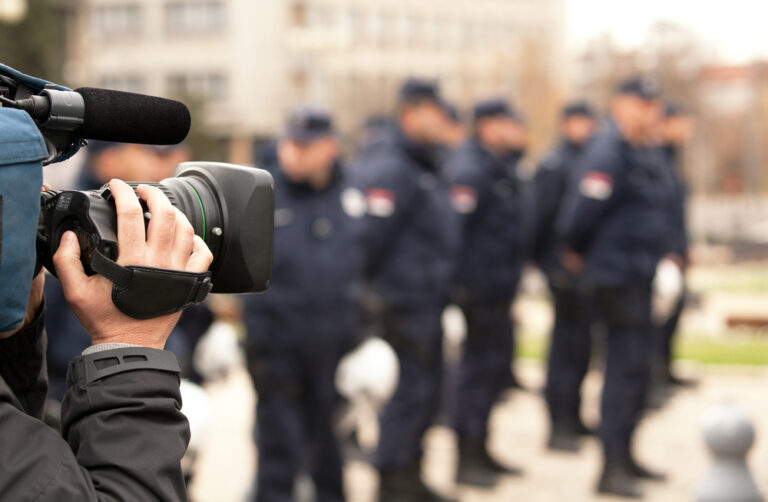
The police are called daily regarding various incidents of public interest. It is our responsibility to provide the…
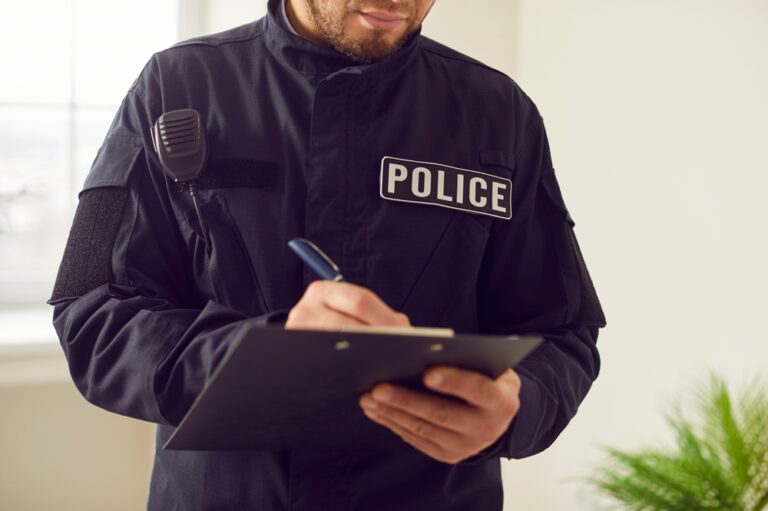
Many police officers experience terrible, traumatic events in the line of duty. A significant number of police officers…